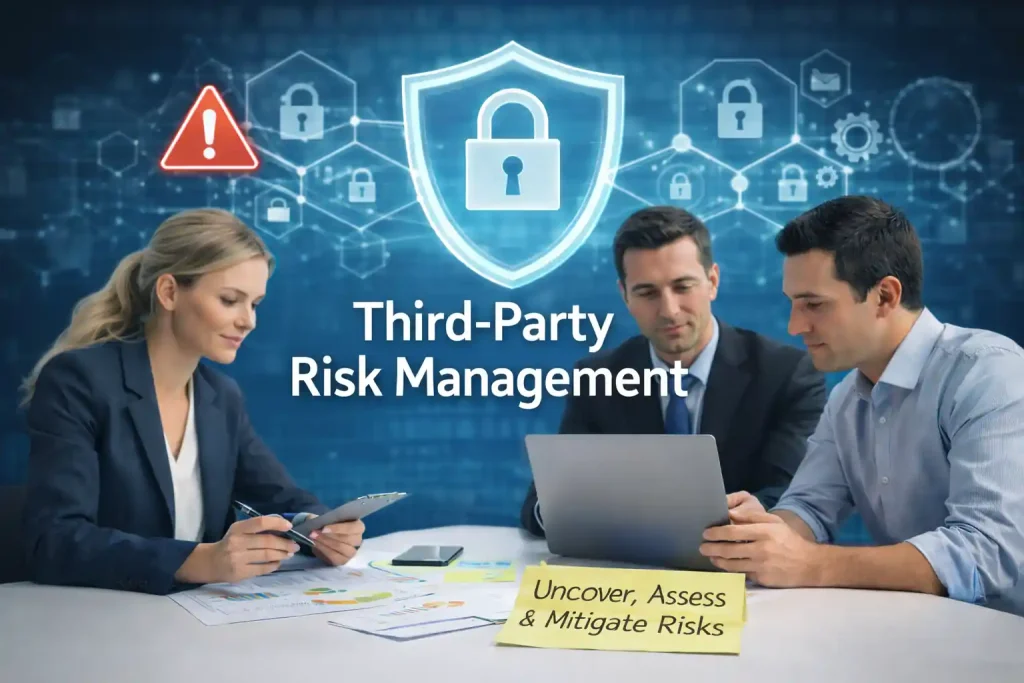Beyond the Handshake: The Modern Blueprint for Third-Party Risk Management
In the current business environment, your success is tethered to your network. But every vendor, contractor, and software provider is a potential gateway for liability. Resilience isn’t about avoiding these partnerships; it’s about mastering Third-Party Risk Management (TPRM). Here is how to harden your perimeter and ensure your partners help—rather than haunt—your growth.
1. Build a Living Response Plan
Static policies fail in a crisis. Create a dynamic plan that dictates who acts and how quickly when a vendor falters. Every strategy must follow the Identify, Analyze, Treat, and Monitor lifecycle.
2. Weaponize Your Due Diligence
Trust is a feeling; data is a fact. Check business credit scores and Secretary of State filings. Vetting reveals financial instability or pending lawsuits before they become your problem.
3. Ironclad Contracts & Exit Strategies
A contract is only as good as its termination clause. Define precise payment cycles and establish a clear “divorce” protocol. You must be able to sever ties the moment a partner becomes a liability.
4. Empower Your Front-Line Sentinels
Your employees see the red flags first—delays, vague emails, or odd requests. If they aren’t trained to recognize and report risk, they are unintentionally part of it.
5. Conduct Compliance “Stress Tests”
Never assume a partner follows the rules. Whether it’s HIPAA or SOC 2, perform periodic internal audits. If you can’t afford a full department, appoint a dedicated officer to ensure standards are met.
6. Enforce Operational Separation
Keep your business identity distinct. By isolating workflows and agreements, you ensure that a single vendor’s failure doesn’t trigger a “bleeding” effect into your core operations.
7. Monitor the Relationship Lifecycle
Risk isn’t a one-time check. A change in leadership or legal structure (like shifting from an LLC to a Corporation) can flip a partner’s risk profile overnight. Monitor these shifts in real-time.
8. Social Media & Reputation Defense
In the digital age, a partner’s ethical lapse is your PR nightmare. Monitor their public behavior; a toxic public image can damage your brand long after a post is deleted.
9. Tactical Face-to-Face Check-ins
Digital reports hide chaos. Attend industry seminars or host shared outings. Real-world interaction reveals stability—or lack thereof—that a balance sheet cannot show.
10. Implement “Zero Trust” Data Security
Secure every link, from Wi-Fi routers to cloud services. Use unique passwords, full-disk encryption, and a “Need-to-Know” access policy. Only share proprietary data when it is strictly necessary.
11. Manage the “Nth-Party” Risk
Your risk extends to your vendor’s vendors. If their sub-contractor is hacked, your data is vulnerable. Always ask for your primary vendor’s own TPRM policies.
12. Eliminate Concentration Risk
Don’t put all your eggs in one basket. If one vendor handles 80% of your capacity, their bankruptcy is yours. Map out “Single Points of Failure” and maintain a vetted secondary option.
13. Align ESG & Ethical Standards
In the current market, you are judged by the company you keep. Ensure partners align with your Environmental, Social, and Governance (ESG) values to avoid “cancel culture” or legal fines.
14. Shift to Continuous Monitoring
Annual surveys are obsolete. Use automated tools for real-time alerts on a partner’s credit drops or legal filings. In a fast economy, a vendor can go from “stable” to “insolvent” in 30 days.
The “Blast Radius” Check
Before signing any new partner, ask: “If this vendor disappeared tomorrow, how long could we survive?” If the answer is less than 24 hours, you aren’t managing a partnership; you’re managing a ticking clock.
